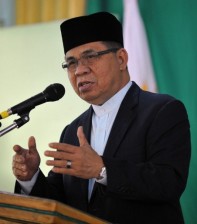OZAMIZ CITY – The Framework Agreement between the government and the Moro Islamic Liberation Front (MILF) may be a big leap forward but it will not, by itself, end the Moro problem, MILF chair Murad Ebrahim said.
In a statement issued in connection with the deal, Murad said much work still has to be done to make peace work.
“The forging of the Framework Agreement does not mean the end of the struggle for it (only) ushers in a new and more challenging stage,” he said.
But Murad said the fact that an agreement was reached after 16 years of negotiations was already a cause for celebration.
“The MILF Central Committee, nonetheless, shares this fruit of the struggle with the Bangsamoro people and the indigenous communities of Mindanao and joins them in celebrating this milestone victory of peace and justice over war and continuous conflict,” Murad said.
He said that amid the people’s positive response to the deal, “a collective effort to build on the gains of the negotiation and to nurture them until finally justice and development reign in our homeland” was needed.
Government chief negotiator Marvic Leonen, in a separate statement, agreed with Murad’s view.
Leonen said the forging of a Framework Agreement on the Bangsamoro with the MILF was just the “momentous start of a process of building a partnership” between erstwhile enemies.
He said he had hoped both parties to be together in “meeting challenge upon challenge” in the work of building the pillars of a democratic self-governing Moro society.
Leonen said unlike the failed memorandum of agreement on ancestral domain, which required tinkering with the constitution, the Framework Agreement was “perfectly within the limits of the country’s 1987 charter.”
“So far as we are concerned, the commitments that we have are entrenched or accommodated in the Constitution,” he said.
Presidential Adviser on the Peace Process Teresita Quintos-Deles said the charter does not prohibit an autonomous entity — like the Bangsamoro — from having a ministerial form of government.
By the end of the year, both parties were expected to hammer out the final details of the ministerial government, especially on the issues of power-sharing and wealth-sharing with the central government.
Power-sharing will define the exclusive powers for either the central government and Bangsamoro, and the powers concurrent to both.
Wealth-sharing will define the flow of generated revenues, especially on the exploitation of natural resources inside the Bangsamoro territory.
The discussion on normalization will largely center on establishing a Bangsamoro police force and the graduated decommissioning of the Bangsamoro Islamic Armed Forces (BIAF), armed wing of the MILF.
Leonen noted that during the forging of the framework agreement, it was the first time for the MILF “to accede to the decommissioning of BIAF” which is composed of some 12,000 armed-bearing troops.
He added that the preliminary pact also recognized the need to transfer law enforcement in the area from the Armed Forces to a police force.
